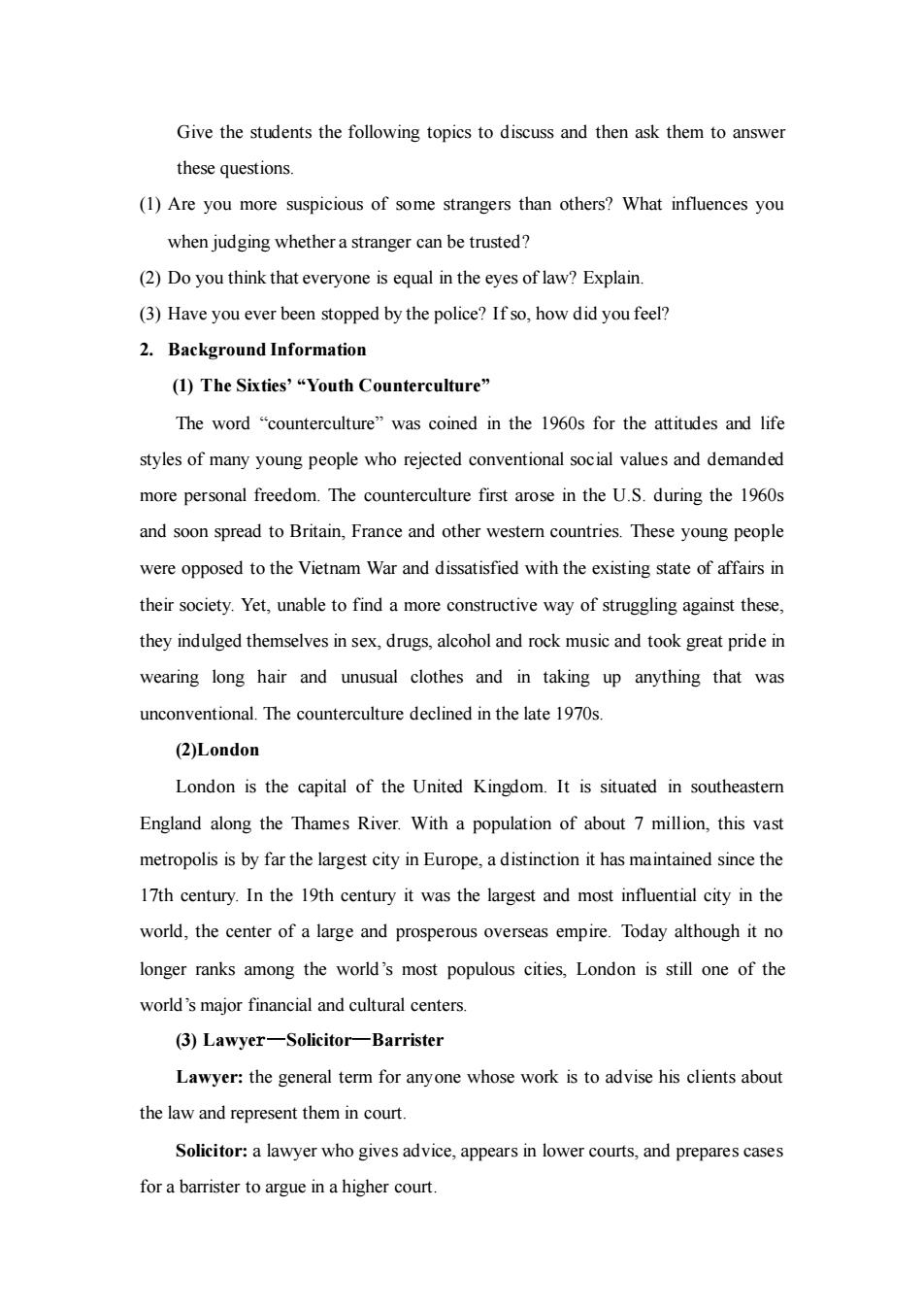正在加载图片...

Give the students the following topics to discuss and then ask them to answer these questions. (1)Are you more suspicious of some strangers than others?What influences you when judging whether a stranger can be trusted? (2)Do you think that everyone is equal in the eyes of law?Explain. (3)Have you ever been stopped by the police?Ifso,how did you feel? 2.Background Information (1)The Sixties'"Youth Counterculture" The word "counterculture"was coined in the 1960s for the attitudes and life styles of many young people who rejected conventional social values and demanded more personal freedom.The counterculture first arose in the U.S.during the 1960s and soon spread to Britain,France and other western countries.These young people were opposed to the Vietnam War and dissatisfied with the existing state of affairs in their society.Yet,unable to find a more constructive way of struggling against these. they indulged themselves in sex,drugs,alcohol and rock music and took great pride in wearing long hair and unusual clothes and in taking up anything that was unconventional.The counterculture declined in the late 1970s. (2)London London is the capital of the United Kingdom.It is situated in southeastern England along the Thames River.With a population of about 7 million,this vast metropolis is by far the largest city in Europe,a distinction it has maintained since the 17th century.In the 19th century it was the largest and most influential city in the world,the center of a large and prosperous overseas empire.Today although it no longer ranks among the world's most populous cities,London is still one of the worlds major financial and cultural centers. (3)Lawyer-Solicitor-Barrister Lawyer:the general term for anyone whose work is to advise his clients about the law and represent them in court. Solicitor:a lawyer who gives advice,appears in lower courts,and prepares cases for a barrister to argue in a higher court.Give the students the following topics to discuss and then ask them to answer these questions. (1) Are you more suspicious of some strangers than others? What influences you when judging whether a stranger can be trusted? (2) Do you think that everyone is equal in the eyes of law? Explain. (3) Have you ever been stopped by the police? If so, how did you feel? 2. Background Information (1) The Sixties’ “Youth Counterculture” The word “counterculture” was coined in the 1960s for the attitudes and life styles of many young people who rejected conventional social values and demanded more personal freedom. The counterculture first arose in the U.S. during the 1960s and soon spread to Britain, France and other western countries. These young people were opposed to the Vietnam War and dissatisfied with the existing state of affairs in their society. Yet, unable to find a more constructive way of struggling against these, they indulged themselves in sex, drugs, alcohol and rock music and took great pride in wearing long hair and unusual clothes and in taking up anything that was unconventional. The counterculture declined in the late 1970s. (2)London London is the capital of the United Kingdom. It is situated in southeastern England along the Thames River. With a population of about 7 million, this vast metropolis is by far the largest city in Europe, a distinction it has maintained since the 17th century. In the 19th century it was the largest and most influential city in the world, the center of a large and prosperous overseas empire. Today although it no longer ranks among the world’s most populous cities, London is still one of the world’s major financial and cultural centers. (3) Lawyer—Solicitor—Barrister Lawyer: the general term for anyone whose work is to advise his clients about the law and represent them in court. Solicitor: a lawyer who gives advice, appears in lower courts, and prepares cases for a barrister to argue in a higher court